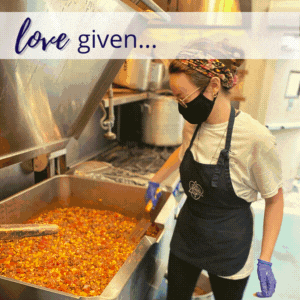By Maria Shibatsuji, Bon Secours Volunteer Ministry
“You’ll come back next month, right?” Alice, one of the residents of the Senior Buildings I visit suddenly asked me. The question took me by surprise. I had finished taking her blood pressure and a few moments earlier we had been discussing our current crocheting projects. As a Program Assistant for the Tele-Heart Program at Bon Secours Hospital, part of my service involves Community Outreach, visiting Senior Apartments in West Baltimore to conduct blood pressure screenings, teach nutrition classes, and help out with the monthly newsletter education. While my supervisor, a cardiac nurse, goes over our newsletter, I take the blood pressures of the senior residents who are present. Alice had been a regular participant in the newsletter education event we hold in her building. She had severe arthritis in her hands and because her disease had progressed, she could no longer use the controller on her motorized wheelchair. When I assured Alice I would of course be back in a month for another newsletter education and blood pressure screening, she replied, “Okay, because I’ll be waiting for you.” Her comment warmed and broke my heart simultaneously.
Social injustices are caused by an imbalance of power and resources, perpetuating feelings of powerlessness and isolation. I am discovering that loneliness is a social justice issue that impacts many of the people I serve. I see loneliness as a form of poverty; a poverty of connection. I would be naive to think that seniors come to my monthly nutrition classes and blood pressure screenings for the sole purpose of gaining knowledge and to monitor their blood pressure. I am realizing that they also come for the conversation, a chance to connect with another fellow human being, and the opportunity to share their wisdom through story-telling and conversation. Talking about loneliness feels taboo, but the truth is, we all have experienced moments of loneliness; of wishing someone, a good friend, a family member, would reach out to us via text or a phone call. While I work primarily with seniors, I know experiencing loneliness is not limited to the elderly. I know when I experience loneliness, I am accessing one of the most human parts of me; a part of me that connects me to the human race, the natural yearning for connection and belonging. We are not the only humans who have felt lonely before and we won’t be the last ones to feel this way.
I am realizing that one of the most important ways I am practicing justice this year is providing an antidote to loneliness; through cultivating connection and developing relationships with those living in poverty-stricken areas. If loneliness results in an individual not feeling heard, practicing justice creates a space where one is acknowledged and fully heard. I have chosen to be a constant companion to the seniors, even if it is only for a year; to be a voice that validates their experiences and encourages inclusiveness. It is in this way that we mutually experience justice.
Anticipating my year of service, I expected to encounter emotional walls that the people I were to serve had put up. I believed these walls would prevent me from fully connecting with them. I remember putting myself in the senior residents’ shoes and concluding that I would have a difficult time letting a stranger into my life. Little did I know, the walls that I imagined were of my own. Transcending cultural borders and age differences, the senior residents I have interacted with have welcomed me into their lives, sharing more deeply than I ever have when I first meet someone. I have had the privilege to learn about their social backgrounds, details about their family members, see their childhood pictures, and tour their apartments. From the sharing of their memories, I have a deeper appreciation for and knowledge of the people of Baltimore. While taking blood pressures and engaging in patient education is important, my actions are futile if not paired with what many seniors value most: the time I spend with them one-on-one. My favorite, and the most important aspects of my position are the same: being fully present to each individual I serve. I listen to and respond to their stories of finding hope amidst change and challenge. The gift of their presence, in turn, has broken down my walls and I hope they feel the same joy they bring to my heart.
To learn more about service opportunities through Bon Secours Volunteer Ministry, please click here.




 Thousands of faith-based service opportunities can be at your fingertips with the RESPONSE. Download the latest edition today!
Thousands of faith-based service opportunities can be at your fingertips with the RESPONSE. Download the latest edition today!
